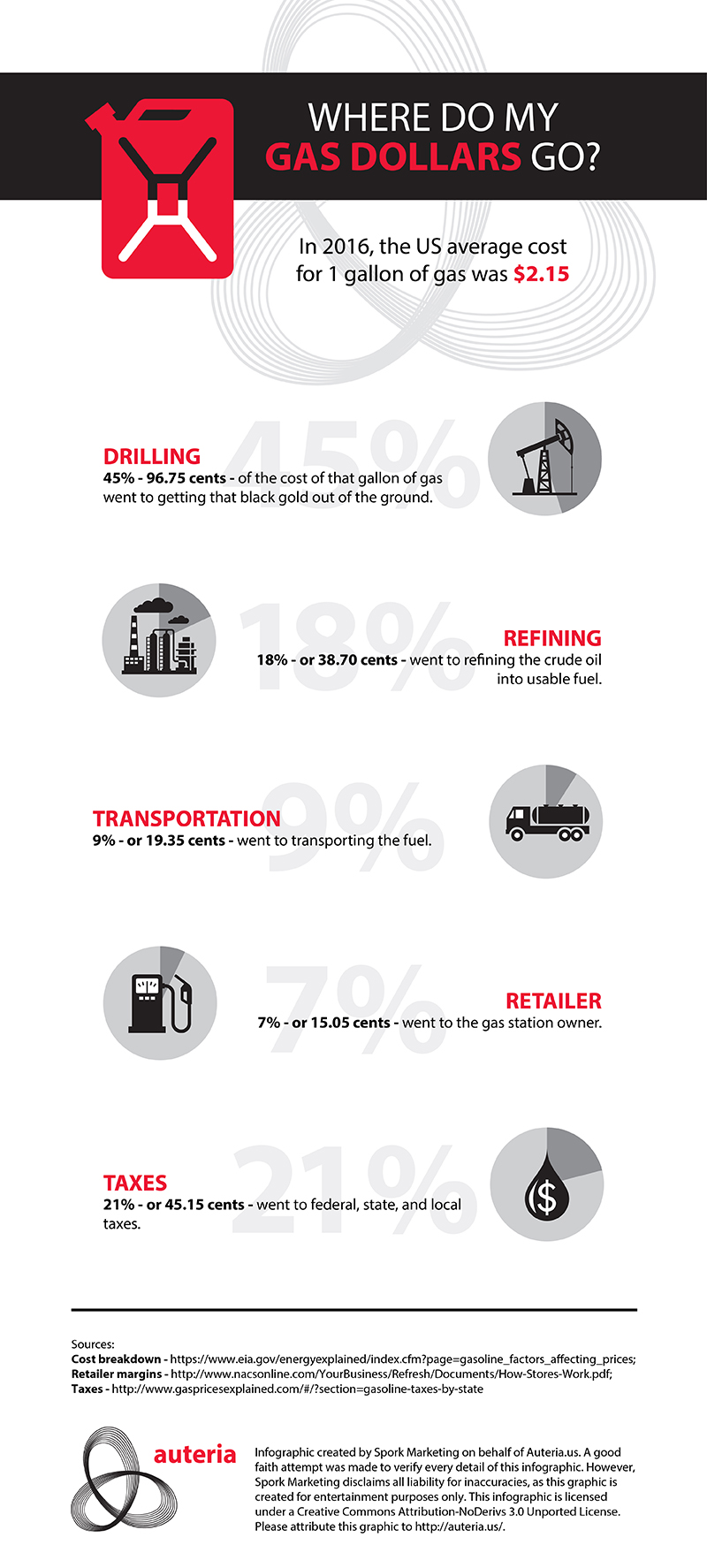Once you’ve calmed down and stopped cussing about the price you pay at the pump when you refill your car, be it classic or contemporary, have you ever wondered about where your money is going?
So has Auteria, a Texas-based supplier of fuel-pump assemblies produced in Mexico for the U.S. and Canadian automotive markets. It engaged in research with Spork Marketing to produce the accompanying chart, which shows who got what from a gallon of gasoline in 2016.

“The 2016 data shows that gas-station retailers receive the smallest percentage of the gallon’s cost, at only 7 percent, while drilling companies receive nearly half of the money paid at the pump,” Auteria said in its news release.
“For those in the petroleum industry, it may not be a surprise that drilling and production companies take the bulk of the amount paid for a gallon of gas,” added Ana Rivera, Auteria product manager. “For consumers, however, it might be a shock to see how little gas retailers earn.”
The research shows that of each $1 spent on gasoline, 45 cents goes to drilling, 21 percent to state, local and federal taxes, 18 cents to refining costs, 9 percent to the cost of transporting that fuel to the gas station, and 7 percent to the retail outlet.
“Using the 2016 data, the average gasoline retailer earned about 15 cents for every gallon of gasoline sold (at the average 2016 price of $2.16 per gallon),” Auteria noted in its release.
“However, out of this 7 percent share, gasoline retailers must cover the costs of storing and dispensing the fuel, payment processing and store overhead costs.
“To illustrate just how little gas stations earn from selling gasoline, payment processing charges are typically 2-3 percent of the total bill. If a retailer earns 7 percent of the cost of a gallon of fuel, and has to pay a 3 percent processing charge, their share of the total falls to 4 percent (less than 10 cents per gallon).”
“As a fuel system parts manufacturer, we are obviously preoccupied with fuel efficiency and saving our customers money on gasoline,” Rivera concluded. “This data is a reminder that the best way to save money on fuel is to use less of it. It’s not as if there are big savings to be had in the gasoline production pipeline, at least as far as we can tell.”






I was in the delivery part of this industry for just shy of a decade
I saw the tight margins the Gasoline stations had to work with.
Really always felt they were getting the short end of the stick. Then the states of the NY/NJ market I worked in forced the station owners to all remove the old underground tanks replace them with very expensive double walled tanks with all kinds of technical checks and readings. Huge cost put allot of small independant stations out of business.
Also last time I was in NY STATE, the state tax on a gallon of gas was at .52 cents per gallon !!!
Just imagine how much that adds up to per year!!!!
Where do those Billions of dollars dissapear too??
BAsically, and like with most things made in the USA, the greatest profiteer is the government through taxation. They get the lion’s share, the biggest cut. When you consider personal income taxes and wage taxes on top of manufacturing profit taxing, the government gets over 1/2 of all profit made. That is essential socialism overshadowing a capitalistic republic and burdening economic growth and expansion, High taxation also reduces wage increases by providing a minimal profit for corporations which they can not pass down to their employees, especially the working class. Government kills everything.
Gee, somehow this article and the "experts" all seem to have neglected to mention the "price support" we are all providing to America’s corn industry! You know, the ethanol we don’t need since we have plenty of oil to crack for gasoline? The ethanol made from corn we could be eating? The stuff every other country makes from sugar cane waste, etc? That stuff? The same stuff that destroys motorcycle gas tanks, clogs fuel injectors and is doesn’t combust as well as its host fuel?
It seems a little strange to me that this report never mentions oil company profits! According to the way the price of gallon of gas is distributed, there is nothing left to make the billions of dollars per year oil companies make!
This would indicate that companies operate on a break-even profit margin, which anyone realizes is not the case!|
Am I wrong, or am I missing something?